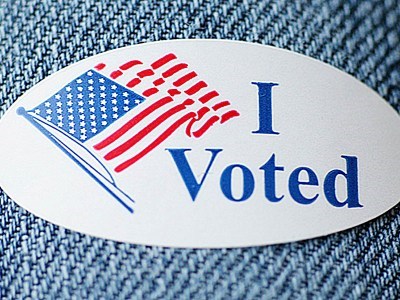
You may remember several months ago when word was first spreading about the crashing and burning of Oklahoma’s budget and what it was going to do to public education.
Our elected leadership cried crocodile tears while flinging the usual rhetoric about how much they love children and teachers and so forth. A number – including Governor Fallin – promised teacher pay raises ranging from “delusionally optimistic” to “OK, now you’re just making fun of us.”
They repeatedly assured us that they were powerless to change the legislation continuing to eliminate state revenue, powerless to change the policies which led to the problem to begin with, powerless to do anything about oil and gas prices or the economy in general, and powerless to stop beating up on educators and 8-year-olds for a single session out of basic human sympathy for our plight.
I’ve never seen so many elected leaders run on “We can’t do anything about ANYTHING! We promise!”
 It was around mid-January when Mindy Dennison of This Teacher Sings first posted about the $30 her family was likely to save this coming year, thanks to these tax cuts about which no one can do anything ever. The idea quickly spread, and soon there were dozens of edu-blogs and even reports in regular media about #GiveItBackOK.
It was around mid-January when Mindy Dennison of This Teacher Sings first posted about the $30 her family was likely to save this coming year, thanks to these tax cuts about which no one can do anything ever. The idea quickly spread, and soon there were dozens of edu-blogs and even reports in regular media about #GiveItBackOK.
Some of you have already done much, and I thank you. Others have had good intentions for quite some time, and… well, those are nice, too.
But I need you to step up now. Again. Or finally. Or more than before. Or something.
Statewide Primaries are on Tuesday, June 28th. You have until June 3rd to get registered to vote if you’re not already and wish to participate in these.
And you DO.
This is when we begin the process of choosing who’ll be setting state edu-policy for the next 2 – 4 years. As in national elections, this is when you help choose your party’s nominee for each office serving the district in which you live. Sometimes there will be multiple candidates from the same party running for an office; sometimes not.
I’ve profiled several candidates and compiled links to further information for many others. My list is not exhaustive, but it’s getting there.
Claudia Swisher of Fourth Generation Teacher is doing something similar, and Angela Little – the force of nature behind Oklahoma Parents and Educators for Public Education on Facebook – has her own version as well. We’re not competing with one another so much as simply approaching some of the elements from different angles.
Why am I telling you all of this?
Because these candidates need your help. Thank you for following them on social media. Thank you for sharing their posts. Those things help, and they matter a great deal.
But they need you in more traditional, less air-conditioned ways as well.
Sitting legislators inevitably have financial support from any number of organizations. If a legislator supports gun rights, then gun rights groups donate to their campaign. If they promote gender equity, groups concerned with such things donate to their campaign.
Most new candidates have very little of this sort of support. A few are crazy well-organized and have expert strategy-teams and committed resources and god bless every one of them. We’ve started a PAC in hopes of supporting some of the most promising, but at best this will mean limited financial help for a handful – those who seem most likely to be worth the extra push. That’s not personal – it’s just reality and politics, two things not known for being pretty and soft.
But most are running on faith and friends and word-of-mouth. They’re trying to get by the same way they did (and many of us do) in the classroom every year – you just pull together what you have and go for it, trusting heart and pluck to make up the difference.

We have a chance to make legitimate change this year. Good change. Potentially great change. But can I be blunt for just a moment?
We also have a chance to fail on a scale we’ve not collectively failed before.
You’re aware of the buzz over so many edu-candidates running this year. Now, imagine the total electoral impact is maybe… two seats. Or three. Imagine none of the really critical districts being won. Imagine none of the most frustrating incumbents being shown the door.
 What do you think happens come February 2017 for public education? Forgive and forget? Nice try? You were so cute running, we’re gonna completely reverse the way we’ve abused you over the past decade just to show what good sports we are?
What do you think happens come February 2017 for public education? Forgive and forget? Nice try? You were so cute running, we’re gonna completely reverse the way we’ve abused you over the past decade just to show what good sports we are?
Unlikely.
So I’m asking you – every classroom teacher, every administrator, every support position, every parent, every adult who for whatever reason keeps reading these posts, to stop right now and figure out who you can support with your tax break this year.
If you’ve already given THAT money, then pretend you haven’t and give it again.
I know that sounds harsh, but this is kind of a big deal.
If you have a GREAT current Representative or Senator who already supports public education consistently, and who’s facing a difficult primary, please call them and let them know of your support, and why, and give to their campaign. Ask if they need someone on the phones, or going door to door. No better press than a satisfied customer.
As to those new folks running across the state, many of whom don’t have experience asking for money and some of whom sound a bit uncomfortable when it even comes up, let me say what they might not:
THEY NEED YOUR MONEY AND THEY NEED IT NOW IF WE’RE GOING TO HAVE ANY REAL CHANCE AT MAKING THIS HAPPEN.
 Those signs cost money. You wouldn’t think they’d be all that critical in this sort of election, but they are. Those websites cost money. That might not be how you get YOUR information, but many people do. Those local newspaper ads, those posters, those door-to-door flyers, they all cost money.
Those signs cost money. You wouldn’t think they’d be all that critical in this sort of election, but they are. Those websites cost money. That might not be how you get YOUR information, but many people do. Those local newspaper ads, those posters, those door-to-door flyers, they all cost money.
None of those things guarantee people will vote for you, but if you DON’T buy the media, people won’t even know your name. If they don’t know your name, they DEFINITELY won’t vote for you.
You don’t even have to live in their district. If right-wing think tanks in Virginia can crank out the cash, no one can begrudge you sending that $50 to the guy two districts over.
THEY NEED YOUR TIME AND THEY NEED IT NOW IF WE’RE GOING TO HAVE ANY REAL CHANCE AT MAKING THIS HAPPEN.
Fill out those contact forms on their websites or reach out to them by phone, Twitter, or Facebook, and ask what you can do. Don’t go it alone – call up the 3 least-annoying people you work with and tell them that you’re going to have some bonding time while building warm-fuzzy-make-a-difference mojo together.
Walk those neighborhoods. Make those calls. Run those unending stupid errands no one else will run, but which have to be done. Figure out who can donate snacks or chairs or funny hats or printing. Explain for the thousandth time why vouchers don’t help public schools, or why punishing teachers for their kids’ socio-economic status isn’t the same as ‘high standards’.
Politely, of course.
I believe, my Eleven Faithful Followers. I believe this can happen. Those of you who know me in real life know that I don’t DO vague, hopeful platitudes. I barely do optimism at all. But I KNOW this can happen.
IF you step up NOW.
I’m broke, too. I’m busy, too. I’m frustrated, too. I have good intentions, too. None of that matters right now. Get out your bank cards and look over your calendar. Talk to your department, your neighbors, your family, and make this a group activity.
It’s time to put your time and money where your proverbial mouth is. It’s time to burn those last few fumes of energy backing up what you share on Facebook.
#GiveItBackOK. #GiveItAllOK. Otherwise, #GiveItUpOK.
[[{“type”:”media”,”view_mode”:”media_original”,”fid”:”2034″,”attributes”:{“alt”:””,”class”:”media-image”,”typeof”:”foaf:Image”}}]]
RELATED POST: #11FF & Getting Involved
RELATED PAGE: #OKElections16

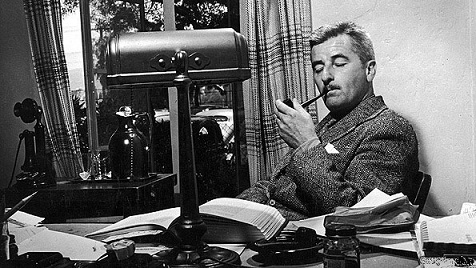
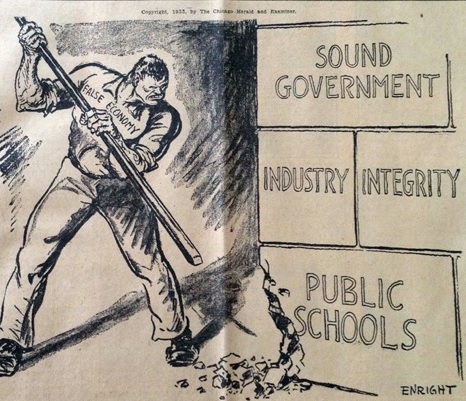 This mindset was a precursor to the Progressive Era and its Amendments – the 16th, 17th, 18th, and 19th. Basically, there was a concern that government at all levels was too far removed from ‘the people.’ Various reforms gave voters more direct input on who was elected and what changes could be made – recalls, referendums, etc.
This mindset was a precursor to the Progressive Era and its Amendments – the 16th, 17th, 18th, and 19th. Basically, there was a concern that government at all levels was too far removed from ‘the people.’ Various reforms gave voters more direct input on who was elected and what changes could be made – recalls, referendums, etc.  That’s important in a decade during which we repeatedly introduce, debate, and occasionally pass state laws which are undeniably doomed once challenged in the courts. We spend hundreds of thousands of dollars fighting for the right to return to the 19th century.
That’s important in a decade during which we repeatedly introduce, debate, and occasionally pass state laws which are undeniably doomed once challenged in the courts. We spend hundreds of thousands of dollars fighting for the right to return to the 19th century. 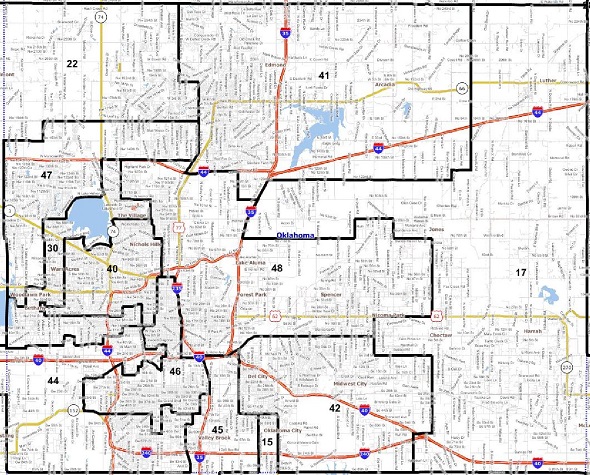
 This has caused untold grief since oil prices crashed. Due to previously passed legislation, the tax cuts for top earners across the state keep waterfalling at preplanned intervals, despite little evidence they’re producing all of that ‘prosperity’ used to justify them in the first place. When anyone suggests perhaps we could slow down on that a bit until we’re no longer feeding on the weak and the young, our legislature cries with hands upraised – “What can we do?! It’s… it’s… AGAINST THE RULES!”
This has caused untold grief since oil prices crashed. Due to previously passed legislation, the tax cuts for top earners across the state keep waterfalling at preplanned intervals, despite little evidence they’re producing all of that ‘prosperity’ used to justify them in the first place. When anyone suggests perhaps we could slow down on that a bit until we’re no longer feeding on the weak and the young, our legislature cries with hands upraised – “What can we do?! It’s… it’s… AGAINST THE RULES!” 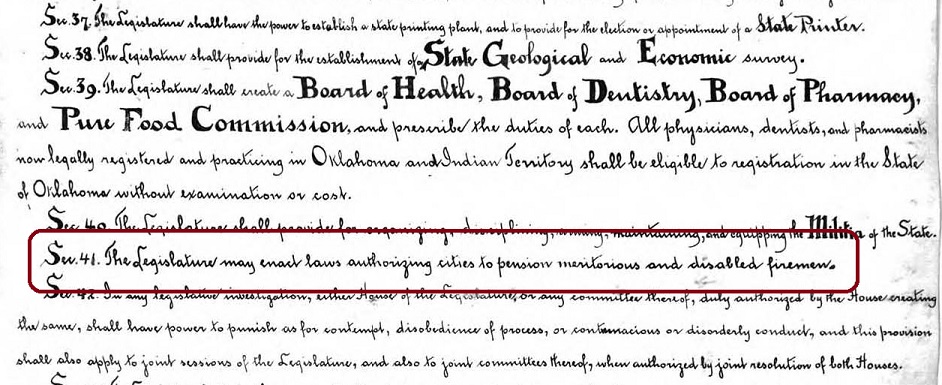
 We’d like to tweak the A-F School District Shaming System by juggling a few phrases, and ohyeahbytheway – THIS IS AN EMERGENCY AND IMMEDIATELY NECESSARY FOR THE PRESERVATION OF THE PUBLIC PEACE, HEALTH, AND SAFETY.
We’d like to tweak the A-F School District Shaming System by juggling a few phrases, and ohyeahbytheway – THIS IS AN EMERGENCY AND IMMEDIATELY NECESSARY FOR THE PRESERVATION OF THE PUBLIC PEACE, HEALTH, AND SAFETY.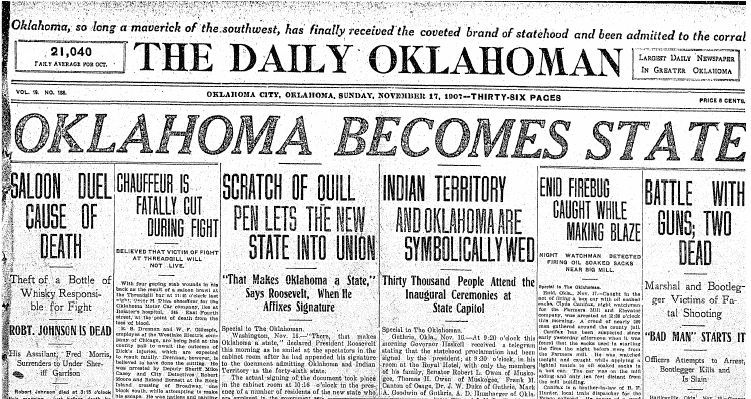
 When the Republican Party became a thing in the 1850s, it pushed two basic tenets: (1) Slavery is bad, and (2) Polygamy is bad. The second was clearly in response to the Latter Day Saints.
When the Republican Party became a thing in the 1850s, it pushed two basic tenets: (1) Slavery is bad, and (2) Polygamy is bad. The second was clearly in response to the Latter Day Saints. 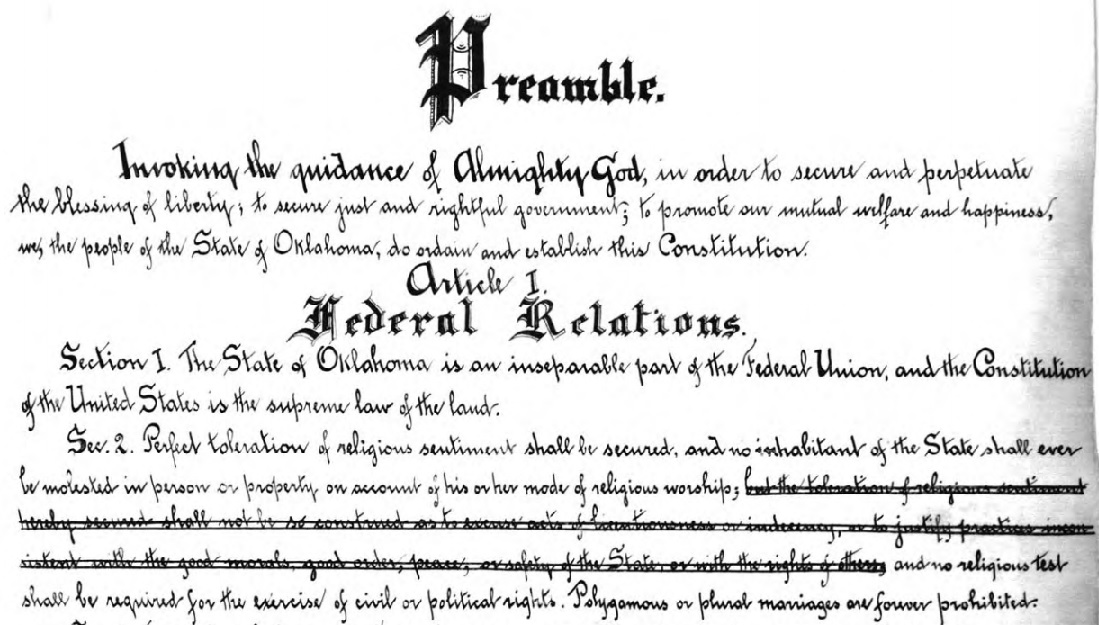
 Look at that. We DID know about the Reconstruction Amendments way back then. Wonder how we lost THAT collective awareness…
Look at that. We DID know about the Reconstruction Amendments way back then. Wonder how we lost THAT collective awareness…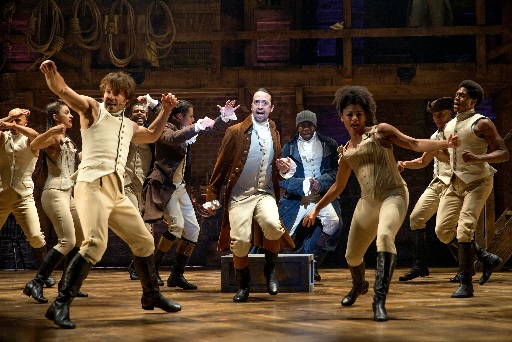 That’s perfectly consistent with American ideals. Jefferson may have changed “life, liberty, and property” to “life, liberty, and the pursuit of happiness,” but the original phrase is used often enough elsewhere to leave little doubt regarding intent.
That’s perfectly consistent with American ideals. Jefferson may have changed “life, liberty, and property” to “life, liberty, and the pursuit of happiness,” but the original phrase is used often enough elsewhere to leave little doubt regarding intent.
 The U.S. Constitution, including all 27 Amendments, takes up less than 14 pages as a Word document with normal fonts and margins. The Oklahoma Constitution, in contrast, takes 221 pages.
The U.S. Constitution, including all 27 Amendments, takes up less than 14 pages as a Word document with normal fonts and margins. The Oklahoma Constitution, in contrast, takes 221 pages. If you know anything about Alfalfa Bill, this is either painfully ironic or ridiculously amusing. Even if you don’t, the founding of Oklahoma on ‘modern thought’ and the ‘highest estimate of intelligence and progress’ should produce some sort of reaction. Perhaps even involuntary regurgitation.
If you know anything about Alfalfa Bill, this is either painfully ironic or ridiculously amusing. Even if you don’t, the founding of Oklahoma on ‘modern thought’ and the ‘highest estimate of intelligence and progress’ should produce some sort of reaction. Perhaps even involuntary regurgitation.  In 1906, the U.S. Congress passed the “Oklahoma Enabling Act,” providing for a single state to be formed from Oklahoma and Indian Territories. Each half sent delegates – mostly Democrats – and William H. Murray was – big shocker here – elected president of this new Constitutional Convention.
In 1906, the U.S. Congress passed the “Oklahoma Enabling Act,” providing for a single state to be formed from Oklahoma and Indian Territories. Each half sent delegates – mostly Democrats – and William H. Murray was – big shocker here – elected president of this new Constitutional Convention. 
 Early in the document (Article II), the drafters enumerated thirty-three rights in the Bill of Rights Article. This was followed by the article on suffrage. The right to vote, except in school board elections, was restricted to males. (The constitution was amended giving women the right to vote in 1918, two years before the U.S. Constitution was amended giving women the right to vote.)
Early in the document (Article II), the drafters enumerated thirty-three rights in the Bill of Rights Article. This was followed by the article on suffrage. The right to vote, except in school board elections, was restricted to males. (The constitution was amended giving women the right to vote in 1918, two years before the U.S. Constitution was amended giving women the right to vote.)  That thing where so many positions are elected rather than appointed is creating headaches even today. It was an age of ‘let the people decide’, creating rules not conducive to our love of ‘voting the party ticket’ for everything from Governor to Dog Catcher to Insurance Commissioner.
That thing where so many positions are elected rather than appointed is creating headaches even today. It was an age of ‘let the people decide’, creating rules not conducive to our love of ‘voting the party ticket’ for everything from Governor to Dog Catcher to Insurance Commissioner. 
 That last part is what’s been so-often cited to explain why we simply CAN’T slow down the almost complete elimination of taxes for anyone wearing expensive suits and smoking cigars in darkened back rooms. Once the process is begun, the argument goes, any reduction of the destruction amounts to a ‘tax increase’.
That last part is what’s been so-often cited to explain why we simply CAN’T slow down the almost complete elimination of taxes for anyone wearing expensive suits and smoking cigars in darkened back rooms. Once the process is begun, the argument goes, any reduction of the destruction amounts to a ‘tax increase’. William Jennings Bryan told the members of the Oklahoma Constitutional Convention that they had borrowed the best provisions of the existing state and national constitutions and had, in the process, created the best constitution ever written. Scholars who believe that brief constitutions devoid of policy make the best constitutions would disagree with Bryan’s assessment.
William Jennings Bryan told the members of the Oklahoma Constitutional Convention that they had borrowed the best provisions of the existing state and national constitutions and had, in the process, created the best constitution ever written. Scholars who believe that brief constitutions devoid of policy make the best constitutions would disagree with Bryan’s assessment. I wanted to compile a short list of talking points, a resource for educators or parents willing to encourage others to get more involved in state elections but unsure what to say. My goal was for it to be succinct, informative, and relatively free of tone and attitude, so as to be more palatable to the masses.
I wanted to compile a short list of talking points, a resource for educators or parents willing to encourage others to get more involved in state elections but unsure what to say. My goal was for it to be succinct, informative, and relatively free of tone and attitude, so as to be more palatable to the masses.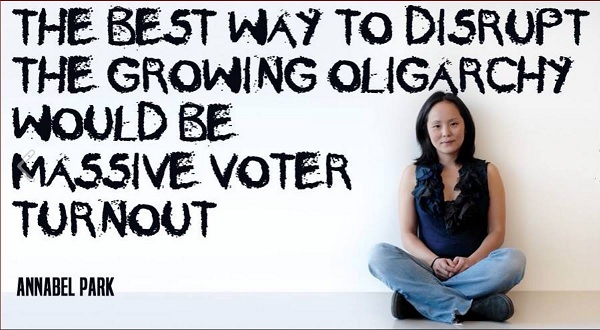 March 1st was, as you were probably aware, the date of the Presidential Primary in Oklahoma. That’s a whole other descent into madness we won’t worry about here.
March 1st was, as you were probably aware, the date of the Presidential Primary in Oklahoma. That’s a whole other descent into madness we won’t worry about here.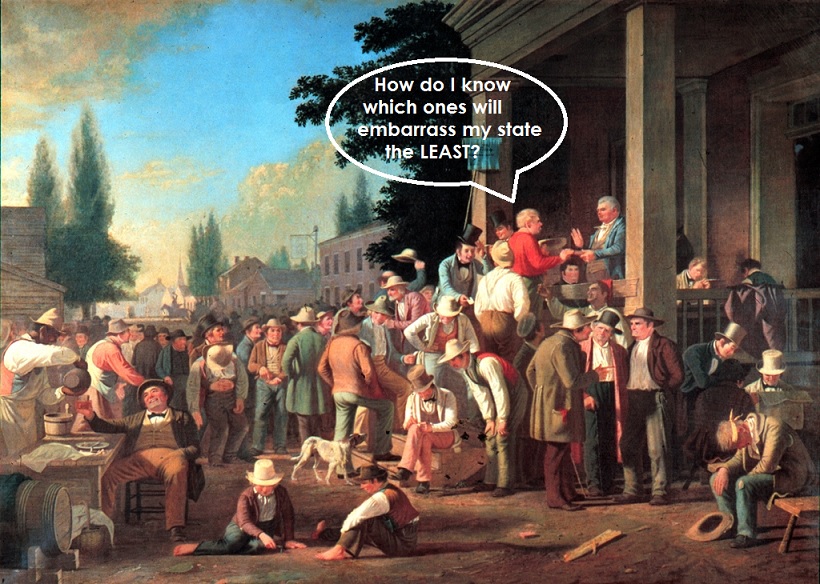 Statewide elections are on the same date – November 8, 2016 – as national elections.
Statewide elections are on the same date – November 8, 2016 – as national elections. 